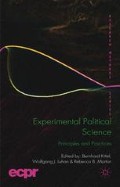Abstract
The claim upon which most experiments in laboratories are conducted is that the random allocation of a treatment among various groups or individuals makes it possible to draw accurate inferences about causality. The laboratory is a context insulated from outside influences so that variations in behavior can be attributed to differences in treatment. Yet, the laboratory is not remote from all noises characterizing the ‘real world’. The issue of internal validity is probably overlooked too often because threats to external validity appear to be the most important (McDermott, 2002; Green and Gerber, 2004). Most experiments in political science are faced with potential threats to internal validity which are often unavoidable. The good news is that most of these problems have no significant impact on the results; the outcomes of an experiment prove to be rather resilient to marginal changes of core characteristics (as remarked earlier by Fiorina and Plott, 1978). This is our general argument, supported by a series of experiments on electoral systems and strategic voting.
Access this chapter
Tax calculation will be finalised at checkout
Purchases are for personal use only
Preview
Unable to display preview. Download preview PDF.
References
Alvarez, R. Michael, Fred Boehmke and Jonathan Nagler (2006) ‘Strategic Voting in British Elections’, Electoral Studies, 25, 1–19.
Alvarez, R. Michael and Jonathan Nagler (2000) ‘A New Approach for Modelling Strategic Voting in Multiparty Elections’, British Journal of Political Science, 30, 57–75.
Blais, André (2004) ‘Strategic Voting in the 2002 French Presidential Election’ in The French Voter: before and after the 2002 elections (Basingstoke: Palgrave).
Blais, André, Simon Labbé-St-Vincent, Jean-François Laslier, Nicolas Sauger and Karine Van der Straeten (2011) ‘Strategic vote choice in one round and two round elections: An experimental study’, Political Research Quarterly, 64, 637–645.
Blais, André, Jean-François Laslier, Annie Laurent, Nicolas Sauger and Karine Van der Straeten (2007) ‘One Round versus Two Round Elections: an Experimental Study’, French Politics, 5, 278–286.
Cox, Gary W. (1997) Making Votes Count: Strategic Coordination in the World’s Electoral Systems (Cambridge: Cambridge University Press).
Duverger, Maurice (1951) Les partis politiques (Paris: Armand Colin).
Fioriana, Morris and Charles Plott (1978) ‘Committee Decisions Under Majority Rule: An Experimental Study’, American Political Science Review, 72, 575–598.
Green, Donald P. and Gerber, Alan S. (2004) ‘Experimental Methods in the Political Science’, American Behavioral Scientist, 47, 485–487.
Grofman, Bernard, Alessandro Chiaramonte, Roberto D’Alimonte and Scott L. Feld (2004) ‘Comparing and Contrasting the Uses of Two Graphical Tools for Displaying Patterns of Multiparty Competition’, Party Politics, 10, 273–299.
Laakso, Markku and Rein Taagepera (1979) ‘Effective number of parties: a measure with application to West Europe’, Comparative Political Studies, 12, 3–27.
Lewis-Beck, Michael S. and Jill Wittrock (2007) ‘Experimenting with French Election Rules: Initial Results’, French Politics, 5, 106–117.
McDermott, Rose (2002) ‘Experimental Methods in Political Science’, Annual Review of Political Science, 5, 31–61.
Morton, Rebecca B. and Kenneth C. Williams (2010) Experimental Political Science and the Study of Causality. From Nature to the Lab (Cambridge: Cambridge University Press).
Mye rson, Roger B. and Robert J. Weber (1993) ‘A theory of voting equilibria’, American Political Science Review, 87, 102–114.
Palfrey, Thomas (2009) ‘Laboratory Experiments in Political Economy’, Annual Review of Political Science, 12, 379–388.
Rietz, Thomas (2008) ‘Three-way Experimental Election Results: Strategic Voting, Coordinated Outcomes and Duverger’s Law’ in Charles R. Plott and Vernon L. Smith, The Handbook of Experimental Economic Results, Volume 1 (Amsterdam: Elsevier).
Taagepera, Rein (2007) ‘Electoral systems’ in Carles Boix and Susan C. Stokes, The Oxford Handbook of Comparative Politics (Oxford: Oxford University Press).
Van der Straeten, Karine, Jean-François Laslier, Nicolas Sauger and André Blais (2010) ‘Strategic, Sincere, and Heuristic Voting under Four Election Rules: An Experimental Study’, Social Choice and Welfare 35, 435–472.
Editor information
Editors and Affiliations
Copyright information
© 2012 Nicolas Sauger , André Blais , Jean-François Laslier and Karine van der Straeten
About this chapter
Cite this chapter
Sauger, N., Blais, A., Laslier, JF., van der Straeten, K. (2012). Strategic Voting in the Laboratory. In: Kittel, B., Luhan, W.J., Morton, R.B. (eds) Experimental Political Science. Research Methods Series. Palgrave Macmillan, London. https://doi.org/10.1057/9781137016645_5
Download citation
DOI: https://doi.org/10.1057/9781137016645_5
Publisher Name: Palgrave Macmillan, London
Print ISBN: 978-1-349-33654-8
Online ISBN: 978-1-137-01664-5
eBook Packages: Palgrave Political & Intern. Studies CollectionPolitical Science and International Studies (R0)

